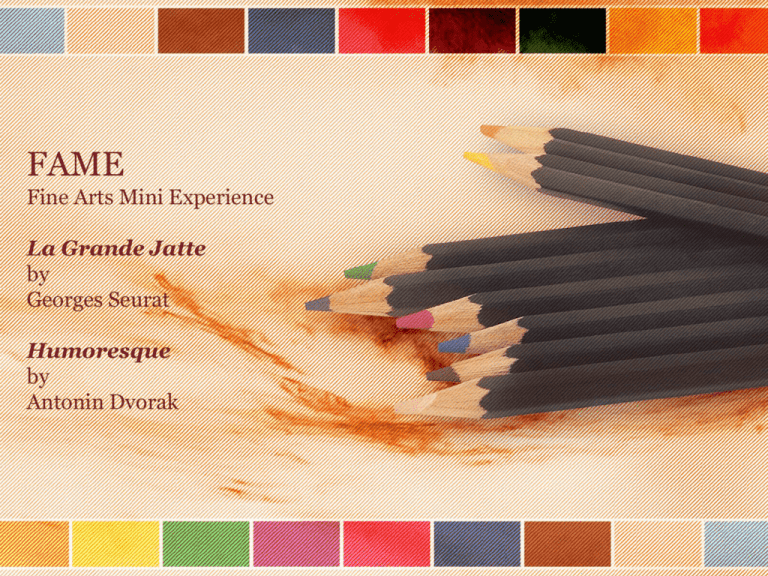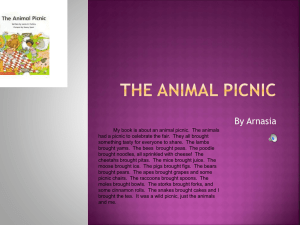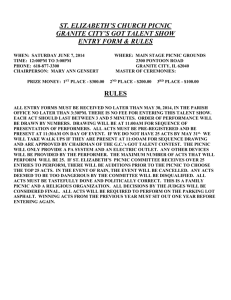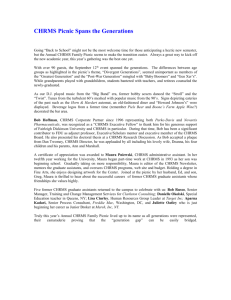Seurat/Dvorak FAME powerpoint
advertisement

FAME Fine Arts Mini Experience La Grande Jatte by Georges Seurat Humoresque by Antonin Dvorak Fine Arts Music Art Literature Dance Does this look like a modern picnic or one from many years ago? Introduction To Art Where do you think you might find this scene? (At a picnic) Where do you usually have picnics? (Yards, parks, etc.) Does this picnic look like it was from a long time ago? Does it look like it takes place in a different country. Would Kentucky Fried Chicken be served? Why not? (It wasn’t invented yet). What are some items that we might bring if we were going on a picnic? If we were going to spend the WHOLE day and really enjoy ourselves --- laugh, eat, and play games, what kinds of items could you take? There are balloons here. Why would there be balloons on a picnic in the park? (For a birthday party) You made some good suggestions for things to take on a picnic. Now let’s look at the items in this picnic basket from a different time and place. We’re going to look at these items in a way that makes us think about an art element. What elements does an artist use to make paintings interesting? (Show Art composition visuals). Our artist for today used color in a very unusual way that also created texture, so we will use some words that describe texture as we look at these items from the picnic basket. “If this monkey was my favorite toy, I might bring it with me on a picnic. The texture word I would use to describe it would be “fuzzy.” Pick at least one more item to describe… Soon, you are going to see a picnic painted by an artist named, Georges Seurat. He used color to create texture in a very new and different way for this time. Art is made up of lines, color, light & shadow, and texture La Grande Jatte • Born in Paris • By 15, he was enrolled in art school • After school, he went into the army and was posted by the sea • He had a hard time dealing with people • Intensely focused, he would paint for long periods of time, eating only croissants and chocolate bars • Dressed meticulously, always wearing a suit and top hat • Never married but had a special friend with whom he had a secret son who died a year after Georges • Georges died of either diphtheria or angina at the age of 32 By Georges Seurat 1859-1891 La Grade Jatte Central characters: 50 people, mostly women, engaged in summer leisure activities Who are they? What are they doing? Why the monkey on the leash? What of the couple behind the tree background central? Are they embracing or adjusting their babies blanket? Why do the two women fishing at the left of the painting have no tackle box or bait? Seurat never answered these questions. Pointillism This was the first of Seurat’s paintings to use the pointillism technique. It was a labor of over two long years. He only used pure, unmixed, complementary (opposite) colors placed next to each other. Our eyes do the mixing. This leaves a “grainy” texture. He repeated shapes: umbrella, boat sail, line of the dog’s tail. Cylindrical shapes: tree trunks, men’s tall hats. Seurat’s other famous works Color Lines Shapes Museum of Modern Art – San Francisco Music consists of: Melody rhythm harmony dynamics Introduction to the Music Besides eating, what do people do on picnics? (Play games, swim, go for a walk or hike, etc.) When you are relaxing on a picnic, do you ever just take a nap, read books, tell stories or jokes? When someone is good at telling jokes, we sometimes say they have a good “sense of humor.” Our music for today has that word humor, in its title. It’s called “Humoresque.” (Put on the recording) Imagine that we are at a park at a band concert listening to Humoresque. Why wouldn’t we have just listened to our stereos? How would you describe this music? Does it make you feel happy, sad, light, heavy? Does it sound light-hearted and full of good humor? Humoresque By Antonin Dvorak Antonin Dvorak was a man who was just like his music – full of good humor and a very happy man. There was only one time when he wasn’t completely happy and that was because he was homesick. What does homesick mean? He taught in the United States for a time but missed his homeland Czechoslovakia. When he returned, “Dvorak was glad to be back!” This will help you remember his name! 1841-1904 • Born in Czechoslovakia to a large, Bohemian family • Initially, his family hoped he would become a butcher like his father • Eventually, he was sent off to music school • He married Anna. They had a happy marriage and had six children. • He became famous throughout Europe and came to work as the director of the Nat’l Conservatory of Music in NY (1892) • He became homesick and returned home • Died 1904 of unknown causes. Listen again to Humoresque and see if the music is the same all the way through. (Point out the staccato parts and the legato part.) Humoresque Think about the difference in these sounds: a faucet drop, drop, dropping and one that is turned on just a little and allowed to flow smoothly. In music, a composer uses the words staccato and legato to tell a musician to plan short, separate, dripping, notes with a tiny bit of silence between them or continuous, flowing, smooth notes. Which sound, staccato or legato, would be more like Seurat’s little dots of paint? The staccato and legato changes are part of the rhythm (the part that makes you want to move). Elements of Rhythm Staccato Legato






